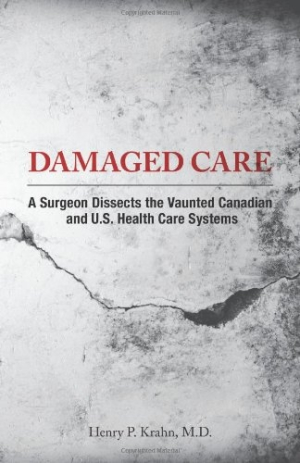Damaged Care
A Surgeon Dissects the Vaunted Canadian and U.S. Health Care Systems
It’s hard not to be shocked by the insider observations present in this timely and thought-provoking book.
Timely and thought-provoking, Damaged Care is an insider’s look at the pros and cons of state-run and privately managed health care. Dr. Henry P. Krahn, a urologist who has worked in Winnipeg and Minnesota, draws upon his experiences to highlight weak points in both the Canadian and American health care systems.
It’s hard not to be shocked by the observations in this book. From ambulances waiting in line to drop patients off at emergency rooms to cancer sufferers dying while waiting for test results, it makes a powerful case for the mismanagement of Canadian health care. As a responsible doctor in Canada, Krahn spent his career fighting the system—sometimes delving into his personal finances to bring his patients better care.
Krahn supports his anecdotal experience with research from both peer-reviewed publications and the mainstream news. However, anecdote is still his most significant persuasive device because Krahn draws so heavily from his own experience. As a result, most of the points here come across as opinions. Krahn’s most directly negative opinions regard the logistical management problems with the Canadian health care system, where patients may wait months for emergency procedures. He does not spare the private US health care industry either, citing a merger of “elite providers” in Massachusetts and the bankruptcies caused by medical bills that are unknown north of the Canadian-American border. However, the shortage of anecdotes about health care in the United States causes this book to fall short of a true comparison of the two health care systems. The heavy reliance on anecdotal information is already somewhat questionable here; Krahn is trying to make a broad point about the health care of an entire nation based mostly on a few personal experiences. But the imbalance between the quantity of Canadian and American anecdotes also leaves the text with a decided tilt toward private health care, despite Krahn’s stated desire for reform of both systems, compounding the credibility problems with this otherwise interesting book.
Damaged Care is passionate and easy to read, bolstering its direct, down-to-earth style with polished eloquence. Its semiautobiographical structure casts Krahn in a sympathetic light, and it is easy to root for him. His concern for his patients is genuine and comes through powerfully in the text.
While it doesn’t necessarily achieve its stated purpose of comparing the American and Canadian systems on equal footing, Damaged Care does expose the flaws of the Canadian health care system. Whether this system is comparable to others of its type is difficult to determine from the text, but for readers with prior knowledge of the subject matter, it could offer a worthwhile perspective. Health care providers in both Canada and the United States may also find this work interesting.
Reviewed by
Anna Call
Disclosure: This article is not an endorsement, but a review. The publisher of this book provided free copies of the book and paid a small fee to have their book reviewed by a professional reviewer. Foreword Reviews and Clarion Reviews make no guarantee that the publisher will receive a positive review. Foreword Magazine, Inc. is disclosing this in accordance with the Federal Trade Commission’s 16 CFR, Part 255.

